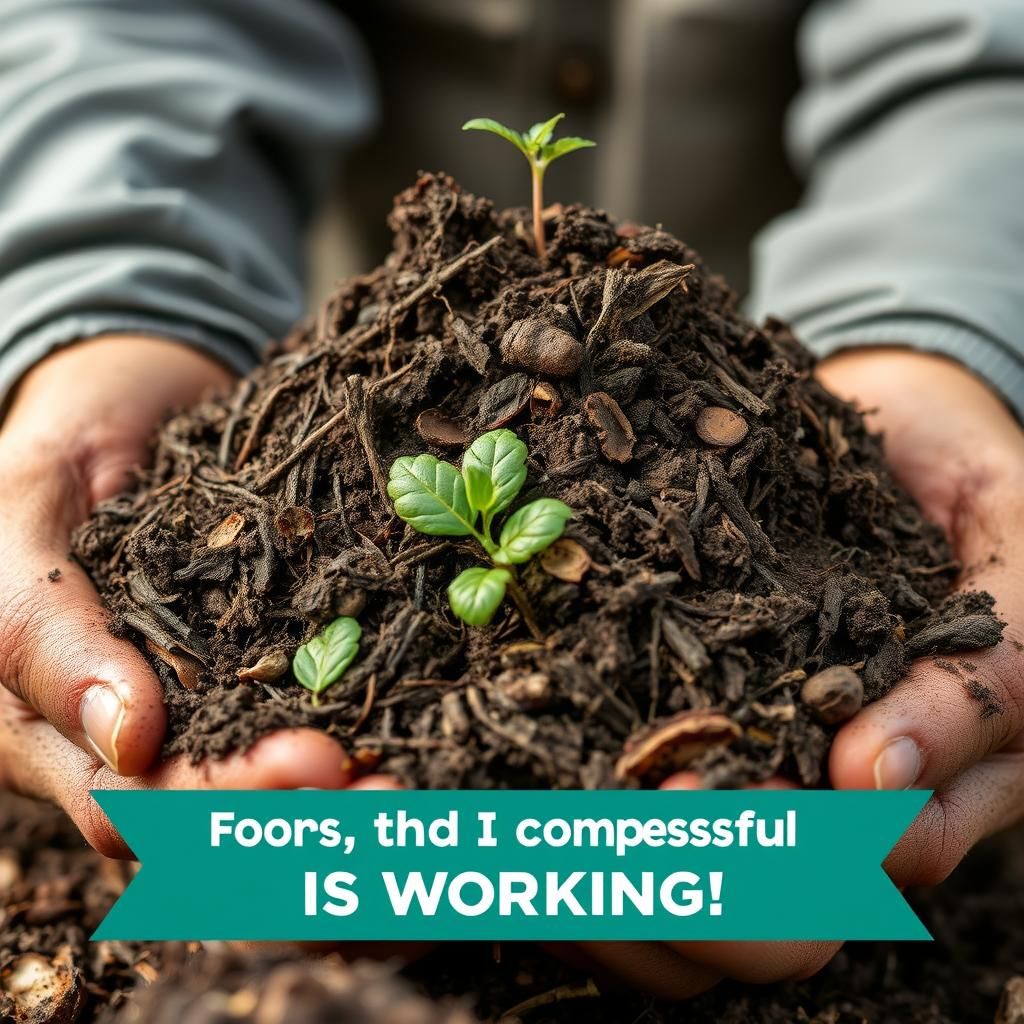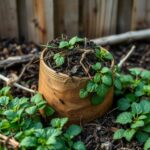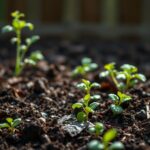How Do You Tell If Your Compost Is Working? Signs and Tips for Successful Composting

Composting is a rewarding way to recycle organic waste and enrich your garden soil. However, many beginners may wonder if their compost is working effectively. Identifying the signs of a successful composting process is essential for optimizing results and maintaining a healthy ecosystem. In this article, we will explore key indicators that show your compost is thriving, as well as practical tips to enhance the composting experience. Understanding these signs not only boosts your confidence as a composter but also ensures that you are contributing positively to the environment. Let's dive into the world of successful composting!
How to Determine If Your Compost Is Working
To find out if your compost is working, you should observe several key indicators that signify the decomposition process is taking place. First, check the temperature of your compost pile; it should be warm in the center, indicating microbial activity. Secondly, assess the smell; a healthy compost should emit a pleasant, earthy odor rather than a foul smell, which could suggest anaerobic conditions. You can also look for evidence of humus, the dark, crumbly substance that indicates the compost is nearing completion. Additionally, moisture levels are crucial; your compost should feel like a damp sponge but not overly wet. Lastly, examine the size of your compost; a decrease in volume over time signifies that materials are breaking down effectively.
Temperature Monitoring
Monitoring the temperature of your compost is essential for assessing its activity level. Initially, a well-balanced compost pile can reach temperatures between 130°F and 160°F, which indicates effective microbial activity. If the pile cools down significantly, it may need additional nitrogen-rich materials or aeration. Regularly checking the temperature not only helps you understand whether the composting process is proceeding correctly but also allows you to adjust conditions to optimize decomposition.
Smell Assessment
The smell of your compost is a vital indicator of its health. A properly decomposing compost should emit a rich, earthy scent. If your compost has a rotten or putrid smell, it may be a sign of anaerobic conditions due to insufficient aeration or an imbalance of green (nitrogen) and brown (carbon) materials. Correcting these issues can help restore the compost to a more balanced state, allowing for the beneficial microorganisms to thrive.
Visual Inspection for Humus
A visual inspection for the presence of humus is a clear sign that your composting is working effectively. Humus appears as a dark, crumbly material that resembles rich soil formed from fully decomposed organic matter. As you mix and aerate your compost, look for the transformation of the original materials into this nutrient-rich substance. The presence of humus means the organic waste is breaking down into a form that can be beneficial for soil.
See also:
Checking Moisture Levels
Moisture is a key component of the composting process, and checking the moisture levels in your pile is essential for successful decomposition. The ideal moisture content should feel similar to a damp sponge. If your compost is too dry, it may slow down microbial activity, while excessive moisture can lead to anaerobic conditions. Adjustments can be made by adding dry materials or watering the pile to achieve the right balance, which is crucial for maintaining active microbial populations.
Volume Reduction
One of the most noticeable signs of effective composting is volume reduction. As the compost materials decompose, you will see a reduction in the size of the pile. This can vary with the types of materials used, but generally, a well-balanced compost pile can shrink by 50% or more over time. This reduction indicates that the materials are breaking down properly, making way for a rich, nutrient-dense end product that can be utilized in your garden.
| Indicator | Significance |
|---|---|
| Temperature | Warm center indicates microbial activity. |
| Smell | Earthy scent indicates healthy compost. |
| Humus Presence | Dark, crumbly material shows decomposition. |
| Moisture Levels | Should feel like a damp sponge for optimal activity. |
| Volume Reduction | Decrease in size indicates breakdown of materials. |
Understanding the Composting Process: What to Look For
To determine whether your compost is working effectively, observe the physical changes in material over time. As microorganisms and earthworms break down organic matter, you'll notice that the pile's volume decreases, and it becomes dark, crumbly, and earthy smelling. A successful compost pile will also generate some heat due to microbial activity, signaling that the decomposition process is actively occurring. Regularly turning the pile and monitoring its moisture content will further enhance aeration and facilitate the breakdown of materials, making it clear that your compost is progressing towards maturity.
Signs of Healthy Compost
Healthy compost exhibits several signs that indicate it is progressing well in the decomposition process. You should look for a dark brown or black color, which signifies that organic matter is breaking down properly. The presence of earthworms and a pleasant earthy smell are also indicators that your compost is thriving. If the material is moist but not soggy, it suggests optimal moisture levels, essential for microbial activity. Finally, a reduction in overall volume shows that the compost is digesting as expected.
Temperature and Composting
Monitoring the temperature of your compost pile is a crucial sign of its health. Typically, a hot compost pile will reach temperatures between 130°F and 160°F (54°C to 71°C) due to the microbial activity within. This heat not only accelerates decomposition but also helps kill off pathogens and weed seeds. If your compost pile fails to reach these temperatures, it may indicate insufficient materials, a need for more aeration, or inadequate moisture. Keeping track of temperature changes helps gauge if your compost is actively decomposing.
See also:
Moisture Levels in Compost
Moisture is another critical factor that can determine the success of your composting efforts. Ideal compost should be as moist as a sponge—not waterlogged, but damp enough to encourage microorganism activity. If your compost is too dry, consider adding water or more green materials like kitchen scraps, which contain water. Conversely, if it’s too wet, it may lead to anaerobic conditions that inhibit decomposition and create foul odors. Adjusting moisture levels is key to maintaining a healthy compost environment.
Common Compost Problems
There are several common issues you may encounter while composting that can indicate your pile is not working correctly. For instance, if you notice a foul odor, it may mean your compost is too wet or lacks oxygen due to compaction. Similarly, if the compost pile is not heating up, it could signify a lack of nitrogen-rich materials or insufficient aeration. Learning to identify these problems and adjusting your methods accordingly can make a significant difference in achieving a successful compost.
Using Finished Compost
Once your compost reaches the desired maturity, it will be ready to use in your garden or plants. Finished compost should resemble crumbly soil with a pleasant earthy smell. At this point, it is excellent for enhancing soil quality, providing nutrients, and improving moisture retention. You can mix it into garden beds, use it as a top dressing for lawn areas, or create potting mixes. Understanding how to utilize finished compost effectively maximizes its benefits for your garden and plants, completing the composting cycle.
Questions from Our Readers
How long does it take for compost to mature?
Compost typically takes between three to six months to mature, depending on factors such as the materials used, moisture levels, and temperature. The process can be expedited by turning the pile regularly and maintaining the correct balance of greens and browns.
What should I look for to know if my compost is ready?
You can tell if your compost is ready when it has a dark, crumbly texture similar to rich soil and has an earthy smell. Additionally, the original materials should no longer be recognizable, indicating that the decomposition process has effectively occurred.
See also:
Is it normal for my compost to smell bad?
Yes, it can be normal for compost to produce some odors initially, especially if it’s too wet or has an imbalance of materials. However, a strong, foul odor can indicate that the compost needs aeration or a better balance of greens and browns.
What types of materials can I add to my compost?
You can add a wide variety of organic materials to your compost, including fruit and vegetable scraps, coffee grounds, grass clippings, and dried leaves. Avoid adding meat, dairy, and oily foods, as they can attract pests and create unpleasant odors.

If you want to read more articles like How Do You Tell If Your Compost Is Working? Signs and Tips for Successful Composting, we recommend you check out our Compost category.
Leave a Reply
Related Articles